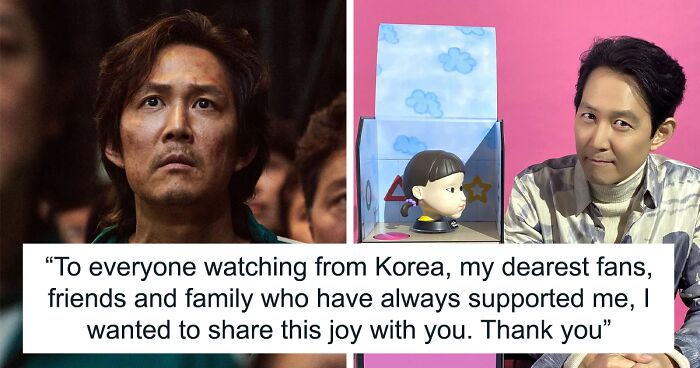
Lee Jung-jae Makes History As The First Asian To Win Emmy For Best Actor In Squid Game Role
Green Light. 무궁화 꽃 이 피었 습니다. Mugunghwa Kkoci Pieot Seumnida. Red Light.
Are you moving? You better not be. The doll is looking at you with its glossy eyes, ready to take you out the second your body fails to stay still. This was one of the most iconic scenes of a TV show that took the world by storm back in 2021. Squid Game.
Now, once again, the show is making history, this time at the Emmy awards. 14 nominations await the excited actors and crew, and one by one their names resonate in the hall, followed by applause from their peers.
However, one win is being focused on more than 5 others, and that is Lee Jung-jae’s win for outstanding lead actor in a drama series, making him the first Asian man to win the award and the first to win it for a non-English show.
Matt Bennett, a philosophy professor at the University of Essex, was kind enough to explain to Bored Panda the complex themes of Squid Game and its links with Meritocracy. Let’s delve into the details!
More info: Television Academy
Squid Game’s Lee Jung-jae won an Emmy, making him the first Asian man to win the award and the first to win it for a non-English show
Image credits: from_jjlee
Squid Game’s Lee Jung-jae has become the first Asian star to win an Emmy award for best male actor in a drama. He won for playing the main role of Seong Gi-hun, a struggling father with a gambling problem trying his best to survive the deadly games and become the sole victor.
This year’s nominees included Jason Bateman (Ozark), Brian Cox (Succession), Bob Odenkirk (Better Call Saul), Adam Scott (Severance), and Jeremy Strong (Succession). Presented by Angela Bassett and Ariana DeBose, the star made history as the first Korean actor to win in this category.
“Thank you so much,” he said during his acceptance speech, “first of all I’d like to thank God above.” “Thank you to director Hwang for making a realistic problem we all face come to life so gracefully and creatively on the screen with a great script and amazing visuals,” he continued.
“To everyone watching from Korea, my dearest fans, friends and family who have always supported me, I wanted to share this joy with you. Thank you,” he said in the on-screen thank-you text.
He played the main role of Seong Gi-hun, a struggling father with a gambling problem trying his best to survive the deadly games and become the sole victor
Image credits: from_jjlee
The show won a total of six Emmy Awards after being nominated for 14. Squid Game won the award for outstanding production design for a narrative contemporary program, outstanding guest actress in a drama series, outstanding special visual effects in a single episode, and outstanding stunt performance.
For those of you who have not watched the show yet, here’s a short, and spoiler-free, summary. Hundreds of players riddled with debt and other money issues accept an invitation to compete in what seem to be children’s games. The winner is promised a whopping 45.6 billion-won prize, while the rest die trying.
“Thank you to director Hwang for making a realistic problem we all face come to life so gracefully and creatively,” Lee said in his acceptance speech
Image credits: from_jjlee
Hwang Dong-hyuk, the creator and director of the show, won the best drama series director prize for the show’s first episode, “Red Light, Green Light.” He is also the first Asian to receive this award, and said he hoped this Emmy wouldn’t be his last.
“I want to thank the TV Academy for this honor and also a huge thank-you to Netflix,” he said in his speech, giving a shout out to Netflix boss Ted Sarandos. “On to season two,” he told the audience. The show was renewed for a second season earlier this year, with Hwang confirming Gi-hun would be returning.
Lee told PEOPLE his hopes for the next installment in the series. “I hope there’s some sort of twist that’ll be exciting and surprising for me and the viewers,” he said in December. “If it was predictable, it would be no fun.”
Image credits: from_jjlee
The dystopian series became the biggest show in Netflix’s history, as well as a global pop culture phenomenon, resonating with many. As South Koreans and many around the world grapple with increasing household debt, income inequality and lack of employment, viewers can understand the lure of the game and relate to the characters.
Hwang told CNN that the inspiration for the show came from a very personal experience of the competitive society of today. “This is a story about losers,” he said. “Those who struggle through the challenges of everyday life and get left behind, while the winners level up.”
Squid Game won 6 Emmy Awards. Hwang Dong-hyuk, the creator of the show, won the best drama series director prize, becoming the first Asian to receive this award
Image credits: Television Academy
Matt Bennett, a philosophy professor at the University of Essex, believes that Squid Game is perhaps at its best when viewed as a critique of meritocracy: a system, organization, or society in which people are chosen and moved into positions of success, power, and influence on the basis of their demonstrated abilities and merit.
Meritocrats believe in fair social competition, a level playing field per say. Matt argues that it has split into two forms: “One maintains that it is better that those who are more talented are in important social positions. That way, so the claim goes, our society makes better use of its talent. The other maintains that people should get what they deserve, and what they deserve is determined by their contribution to society, and perhaps also their level of effort.”
But in a competitive society, not everyone has a fair chance of winning. The latter form of meritocracy, as Matt states, has been instrumental in “legitimating policies that increase suffering for the less privileged.”
The dystopian series became the biggest show in Netflix’s history, as well as a global pop culture phenomenon, resonating with many viewers
Image credits: from_jjlee
The dark side of meritocracy is that it justifies inequality on the grounds that the better-off have earned their position, with the implication that the worse off also deserve their lot. Winner takes all, the losers die, and participants have no choice but to play.
“This meritocratic ideology is falsified, in part, by the extent to which our positions in society are almost always determined by many factors out of control, which we might call ‘luck,'” Matt argues. “But even if luck had nothing to do with how we fare in the ‘game of life,’ we still have to ask ourselves how much we want people who fall behind others in competitions for jobs, education, and income, to suffer as a result. It seems to me in a humane competitive society would put limits on the different outcomes between winners and losers.”
Competition in its own right isn’t a bad thing; on the contrary, it may “incentivize improvements and achievement,” help us socialize and bond with others. Yet, when it comes to meritocracy, as Matt explains, it uses competition “to distribute the most important social goods, and justifying the inequalities that result from social competition in meritocratic terms. I find it hard to accept that there could be a plausible scenario in which this would be a good thing to do.”
“I hope there’s some sort of twist that’ll be exciting and surprising for me and the viewers,” Lee said as the show was renewed for a second season earlier this year
Image credits: from_jjlee
When it comes to Squid Game, Matt believes that “the show responds to a high degree of material inequality, the desperate situation of the poorest in society, and the cruel irony of being made to feel that being on the sharp end of inequality is our own fault.”
“But Squid Game does not obviously take this situation to be an intrinsic feature of human existence. It seems to suggest that there are human qualities that give us hope for something different.”
Matt believes that if the show continues to follow the patterns of meritocracy, which we’ve seen play out in our societies, season two may “see some kind of consciousness-raising among the poor, debt-laden” characters: “Characters in season two might join together to demand protections for the most vulnerable. Or populist leaders might emerge, scapegoating migrants, the disabled, and the unemployed.”
“Both developments have occurred in a number of countries around the world that have previously convinced their electorates that they can get ahead if they try hard enough,” Matt continues. “This myth is no longer as strong as it once was, but what comes next has so far proven unstable and at times, particularly with the rise of the far-right in many parts of Europe, dangerous.”
We’re very happy for Squid Game’s team as they definitely deserve the recognition and awards. We can’t wait to see what happens in the next season!
Image credits: from_jjlee
We’re very happy for Squid Game’s team as they definitely deserve the recognition and awards. We can’t wait to see what happens in the next season and hope that this is just the beginning of an iconic series.
Let us know your thoughts in the comments below—have you been an avid fan of Squid Game? Would you participate in these kinds of games? Always remember to upvote and follow the author as it helps out a lot, and I shall see you all in the next one!
People are calling this a historic moment for Korean TV and are excited for the future of Squid Game. Let us know what you think in the comments below!
1k+views
Share on FacebookThe whole cast is amazing. Even the minor players give great performances. So psyched for season 2.
Sandra Oh has won Golden Globe, Critic's Choice and Screen Actor's Guild awards. She is Canadian, but is of Asian heritage. Jung-Jae's Emmy recognition is merited. However, his history is littered with several DUI's, two assault charges and homophobic remarks about a colleague.
The whole cast is amazing. Even the minor players give great performances. So psyched for season 2.
Sandra Oh has won Golden Globe, Critic's Choice and Screen Actor's Guild awards. She is Canadian, but is of Asian heritage. Jung-Jae's Emmy recognition is merited. However, his history is littered with several DUI's, two assault charges and homophobic remarks about a colleague.

 Dark Mode
Dark Mode 

 No fees, cancel anytime
No fees, cancel anytime 






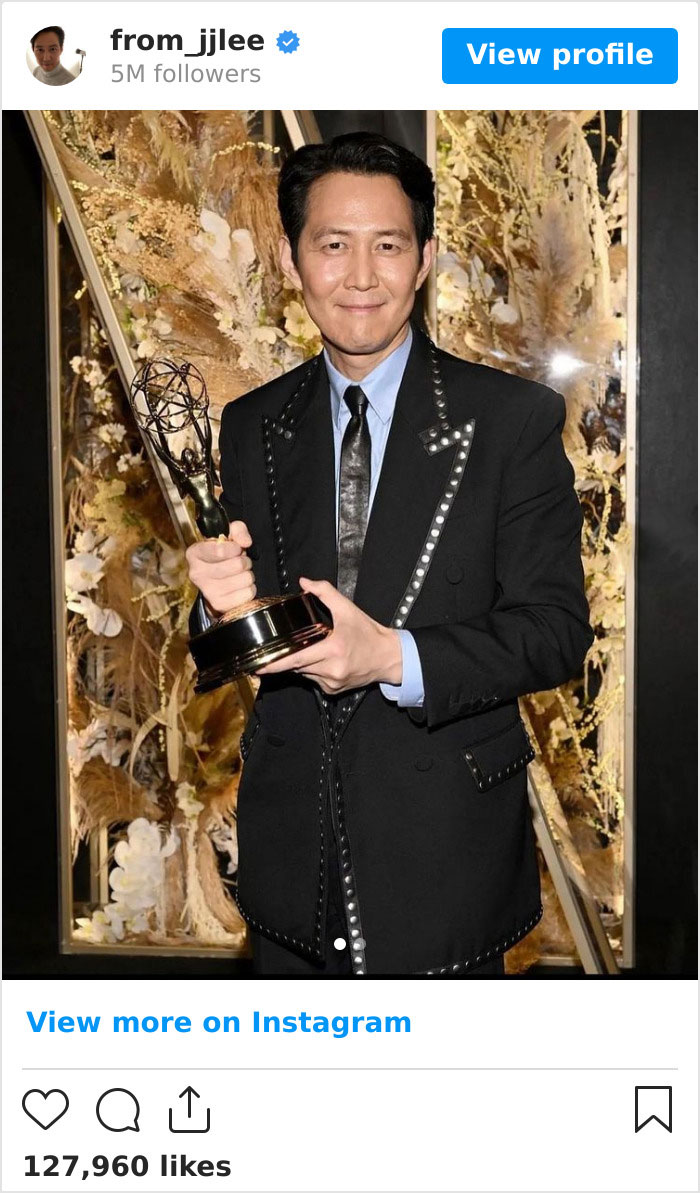
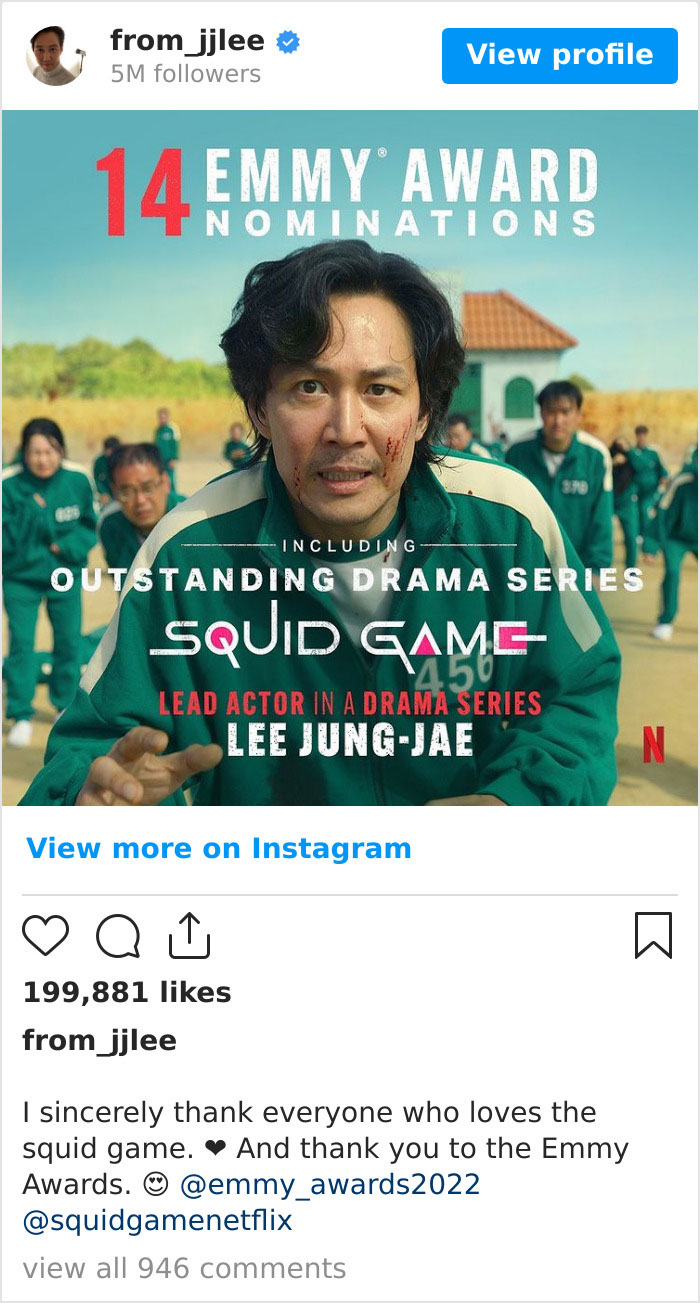
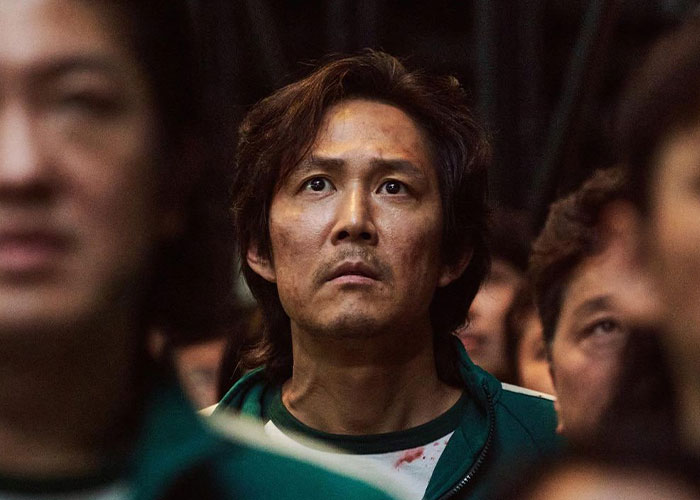
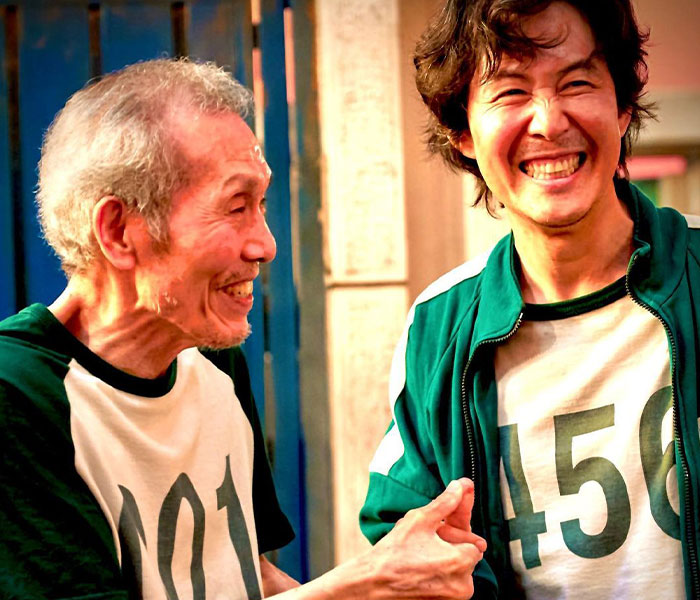
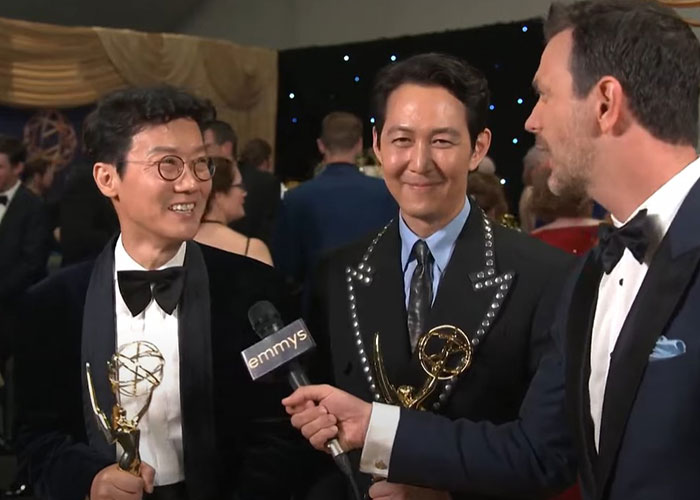
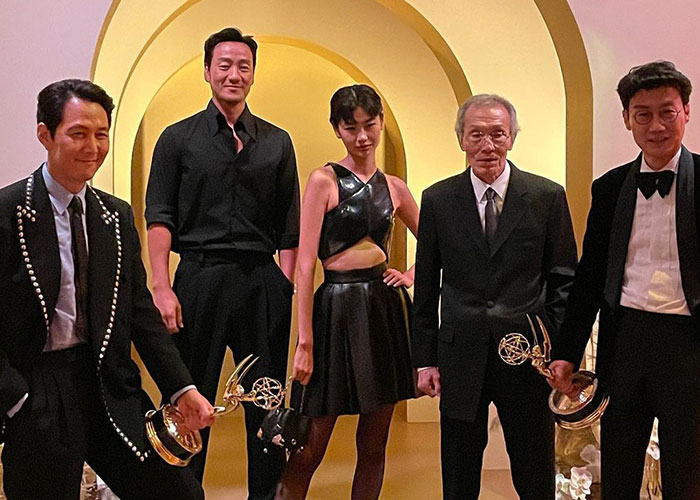
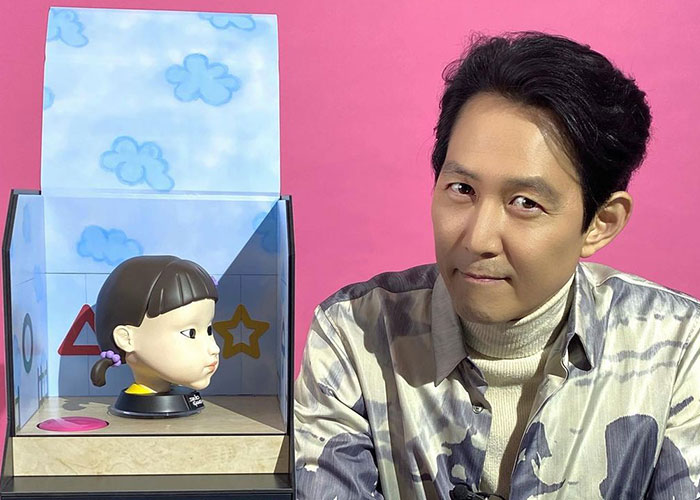
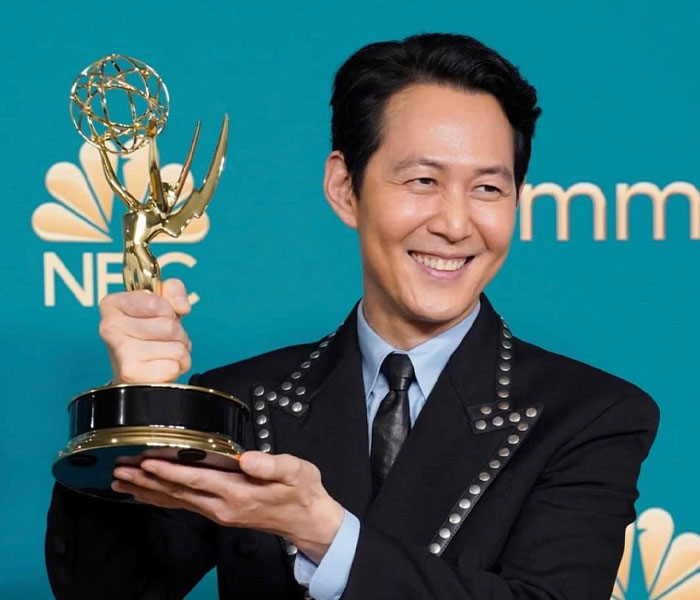






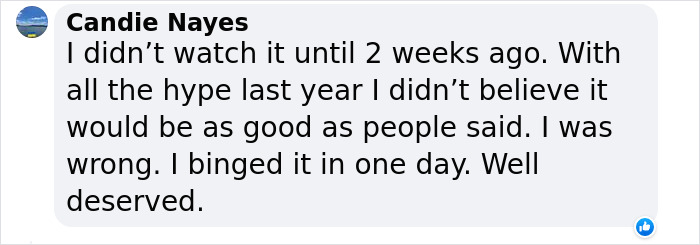
















































101
7